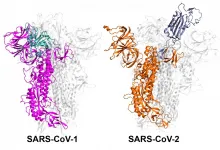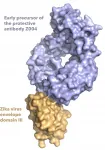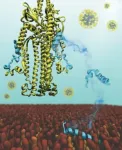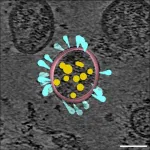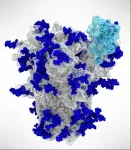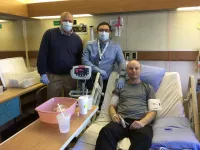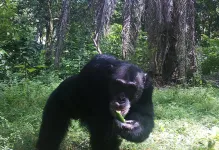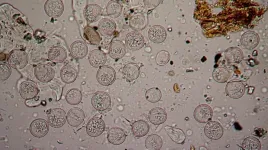INFORMATION:
Real-world effectiveness of COVID-19 vaccine - research by Clalit Research Institute
First large-scale peer-reviewed study of real-world effectiveness of COVID-19 vaccine by Israel's Clalit Research Institute published in The New England Journal of Medicine
2021-02-25
(Press-News.org) The Clalit Research Institute, in collaboration with researchers from Harvard University, analyzed one of the world's largest integrated health record databases to examine the effectiveness of the Pfizer vaccine against COVID-19. The study provides the first large-scale peer-reviewed evaluation of the effectiveness of a COVID-19 vaccine in a nationwide mass-vaccination setting. The study was conducted in Israel, which currently leads the world in COVID-19 vaccination rates.
The results of this study validate and complement the previously reported findings of the Pfizer/BioNTech Phase-III randomized clinical trial, which focused on symptomatic infections, and which, with 21,720 vaccinated individuals, could not precisely assess vaccine effectiveness against severe disease in the fully vaccinated. The present study's large size allows a more detailed assessment of the vaccine's effectiveness in preventing a wider range of outcomes, across different time periods and population sub-groups.
The study took place from December 20, 2020, the launch of Israel's national vaccination drive to February 1, 2021. It coincided with Israel's third and largest wave of coronavirus infection and illness, during which the B.1.1.7 variant gradually became the dominant strain in the country for new infections.
Researchers reviewed data from 596,618 vaccinated individuals aged 16 and over (of whom approximately 170,000 were aged 60+). These individuals were carefully matched with 596,618 unvaccinated individuals based on an extensive set of demographic, geographic and health-related attributes associated with risk of infection, risk of severe disease, health status and health seeking behavior. Individuals were assigned to each group dynamically based on their changing vaccination status (approximately 85,000 individuals moved from the unvaccinated cohort into the vaccinated cohort during the study). Multiple sensitivity analyses were conducted to ensure that the estimated vaccine effectiveness was robust to potential biases.
The results show that in fully vaccinated individuals (7 or more days after the second dose), the risk of symptomatic COVID-19 decreased by 94% compared with the unvaccinated, while the risk of severe disease decreased by 92%. In the period immediately preceding the second dose (days 14-20 after the first dose), vaccine effectiveness was lower, but still substantial -- the risk of symptomatic COVID-19 decreased by 57% in vaccinated individuals, and the risk of severe disease by 62%. While there was insufficient data to provide an estimate on the reduction in mortality in those who received two doses, data from 21-27 days after the first dose points to a substantial reduction in mortality as well.
As an observational study conducted in a mass-vaccination setting, this study was not designed to systematically assess viral transmission or asymptomatic infections. With the careful matching procedures, multiple outcomes assessed and multiple sensitivity analyses performed, the large sample size in this study also allowed the estimation of vaccine effectiveness in a number of specific subpopulations. The vaccine effectiveness for preventing symptomatic COVID-19 proved consistent across age groups, including adults aged 70+. The study also evaluated subpopulations with different numbers of comorbidities and found indications that vaccine effectiveness for preventing symptomatic COVID-19 may be slightly lower for individuals with a higher number of comorbidities, although the difference was not statistically significant.
The research was conducted by Dr. Noa Dagan, Dr. Noam Barda, Dr. Eldad Kepten, Oren Miron, Shai Perchik, Dr. Mark Katz and Prof. Ran Balicer from the Clalit Research Institute, as well as Prof. Miguel Hernán and Prof. Marc Lipsitch of the Harvard T.H. Chan School of Public Health, and Prof. Ben Reis of Boston Children's Hospital and Harvard Medical School.
"The swift nationwide rollout of Israel's COVID-19 vaccination campaign provided the Clalit Research Institute with a unique opportunity to assess, through its rich digital datasets, the effects of the vaccine in a real-world setting in all population sub-groups," said Prof. Ran Balicer, senior author of the study, Director of the Clalit Research Institute and Chief Innovation Officer for Clalit. "These results show convincingly that this vaccine is highly effective against symptomatic COVID-19, one week after the second dose. These results are similar to those reported in the previously published clinical trial, despite the challenges inherent in a mass-vaccination setting."
"The results also correlate well with recent population-level trends in Israel, which have seen a sustained decline in hospitalization and severe disease in the mostly-vaccinated older age groups, alongside a delayed decline among younger age groups for whom vaccination began several weeks later. These data, together with the anticipated impact of the ongoing vaccination campaign in Israel, where nearly half the population has already been vaccinated, have had a significant impact on government decisions to ease restrictions imposed during Israel's recent third lockdown," explains Prof. Balicer, who also serves as Chairman of Israel's National Expert Advisory Team on COVID-19 response.
Prof. Miguel Hernán of the Harvard T.H. Chan School of Public Health, said, "This research is a perfect example of how randomized trials and observational healthcare databases complement each other. The original trial of the Pfizer/BioNTech vaccine provided compelling evidence of its effectiveness to prevent symptomatic infection, but the estimates for severe disease and specific age groups were too imprecise. This analysis of Clalit's high-quality database emulates the design of the original trial, uses its findings as a benchmark, and expands upon them to confirm the vaccine's effectiveness on severe disease and in different age groups. This combination of evidence from randomized trials and observational studies is a model for efficient medical research, something which is especially important in COVID times."
Prof. Marc Lipsitch, Director of the Center for Communicable Disease Dynamics and Professor at the Harvard T.H. Chan School of Public Health, said, "In all studies of vaccine effectiveness, a major challenge is to ensure that those we are comparing to identify the vaccine's effect are similar in the other characteristics that may predict whether they get infected or ill. This is especially hard in the context of a rapidly growing, age-targeted vaccine campaign. Clalit's extraordinary database made it possible to design a study that addressed these challenges in a way that provides tremendous confidence in the inferences that come out of the study."
Prof. Ben Reis, Director of the Predictive Medicine Group at Boston Children's Hospital and Harvard Medical School, said, "Israel's impressive vaccination campaign, together with Clalit's unique integrated data sources, presented a rare opportunity to study the effects of the vaccine in a real-world mass-vaccination setting." He continued, "The global scientific cavalry charge that enabled the development of vaccines in record time is now continuing with international collaborations focused on evaluating vaccine effectiveness. The virus doesn't recognize borders, neither should the scientists hoping to fight it. This is how science should be done."
ELSE PRESS RELEASES FROM THIS DATE:
Novel pooled testing strategies can significantly better identify COVID-19 infections
2021-02-25
Boston, MA - A new approach to pooled COVID-19 testing can be a highly effective tool for curbing the SARS-CoV-2 pandemic, even if infections are widespread in a community, according to researchers at Harvard T.H. Chan School of Public Health and the Broad Institute of MIT and Harvard. Simple pooled testing schemes could be implemented with minimal changes to current testing infrastructures in clinical and public health laboratories.
"Our research adds another tool to the testing and public health toolbox," said Michael Mina, assistant professor of epidemiology at Harvard Chan School and associate member of the Broad. "For public health agencies and clinical laboratories ...
Why some coronavirus strains are more infectious than others
2021-02-25
ROCKVILLE, MD - Coronavirus outbreaks have occurred periodically, but none have been as devastating as the COVID-19 pandemic. Vivek Govind Kumar, a graduate student, and colleagues in the lab of Mahmoud Moradi at the University of Arkansas, have discovered one reason that likely makes SARS-CoV-2, the virus that causes COVID-19, so much more infectious than SARS-CoV-1, which caused the 2003 SARS outbreak. Moradi will present the research on Thursday, February 25 at the 65th Annual Meeting of the Biophysical Society
The first step in coronavirus infection is for the virus to enter cells. For this entry, the spike proteins on the outside of ...
Scientists reveal details of antibodies that work against Zika virus
2021-02-25
ROCKVILLE, MD - The Zika outbreak of 2015 and 2016 is having lasting impacts on children whose mothers became infected with the virus while they were pregnant. Though the numbers of Zika virus infections have dropped, which scientists speculate may be due to herd immunity in some areas, there is still potential for future outbreaks. To prevent such outbreaks, scientists want to understand how the immune system recognizes Zika virus, in hopes of developing vaccines against it. Shannon Esswein, a graduate student, and Pamela Bjorkman, a professor, at the California Institute of Technology, have new insights on how the body's antibodies attach to Zika virus. Esswein will present the work, which was published in PNAS, on Thursday, February ...
Scientists uncover new details of SARS-CoV-2 interactions with human cells
2021-02-25
ROCKVILLE, MD - If the coronavirus were a cargo ship, it would need to deliver its contents to a dock in order to infect the host island. The first step of infection would be anchoring by the dock, and step two would be tethering to the dock to bring the ship close enough that it could set up a gangplank and unload. Most treatments and vaccines have focused on blocking the ability of the ship to anchor, but the next step is another potential target. New research by Defne Gorgun, a graduate student, and colleagues in the lab of Emad Tajkhorshid at the University of Illinois addresses the molecular details of this second step, which could inform the design of drugs that block it. Gorgun will present her research on Thursday, February 25 at the ...
Antibodies recognize and attack different SARS-CoV-2 spike shapes
2021-02-25
ROCKVILLE, MD - The virus that causes COVID-19 belongs to the family of coronaviruses, "corona" referring to the spikes on the viral surface. These spikes are not static--to infect cells, they change shapes. Maolin Lu, an associate research scientist at Yale University, directly visualized the changing shapes of those spike proteins and monitored how the shapes change when COVID-19 patient antibodies attach. Her work, which was published in Cell Host & Microbe in December 2020 and will be presented on Thursday, February 25 at the 65th Annual Meeting of the Biophysical Society informs the development of ...
How SARS-CoV-2's sugar-coated shield helps activate the virus
2021-02-25
ROCKVILLE, MD - One thing that makes SARS-CoV-2, the virus that causes COVID-19, elusive to the immune system is that it is covered in sugars called glycans. Once SARS-CoV-2 infects someone's body, it becomes covered in that person's unique glycans, making it difficult for the immune system to recognize the virus as something it needs to fight. Those glycans also play an important role in activating the virus. Terra Sztain-Pedone, a graduate student, and colleagues in the labs of Rommie Amaro at the University of California, San Diego and Lillian Chong at the University of Pittsburgh, studied exactly how the glycans activate SARS-CoV-2. Sztain-Pedone will present the research on Thursday, February 25 at the 65th Annual Meeting ...
A Canadian success story: world-first to treat Fabry disease with gene therapy
2021-02-25
(Thursday, Feb. 25, 2021, Toronto)--Results of a world-first Canadian pilot study on patients treated with gene therapy for Fabry disease show that the treatment is working and safe.
The Canadian research team was the first to use gene therapy in 2017 to treat patients with Fabry disease, a rare, chronic illness that can damage major organs and shorten lives. They report their findings today in the journal Nature Communications.
"Being one of the first people in the world to receive this treatment, and seeing how much better I felt afterward, it definitely gives me hope that this can help many other Fabry patients and potentially those with other single gene mutation disorders," says Ryan Deveau, one of the ...
Chimpanzees and humans share overlapping territories
2021-02-25
Chimpanzees and humans "overlap" in their use of forests and even villages, new research shows.
Scientists used camera traps to track the movements of western chimpanzees - a critically endangered species - in Guinea-Bissau.
Chimpanzees used areas away from villages and agriculture more intensively, but entered land used by humans to get fruit - especially when wild fruits were scarce.
Researchers from the University of Exeter and Oxford Brookes University say the approach used in this study could help to inform a "coexistence strategy" for chimpanzees ...
Allergy season starts earlier each year due to climate change and pollen transport
2021-02-25
Allergy sufferers are no strangers to problems with pollen. But now - due to climate change - the pollen season is lasting longer and starting earlier than ever before, meaning more days of itchy eyes and runny noses. Warmer temperatures cause flowers to bloom earlier, while higher CO2 levels cause more pollen to be produced.
The effects of climate change on the pollen season have been studied at-length, and END ...
Study shows opioid use among US patients with knee osteoarthritis costs 14 billion dollars in societal costs
2021-02-25
Although guidelines do not recommend use of opioids to manage pain for individuals with knee osteoarthritis, a recent study published early online in END ...
LAST 30 PRESS RELEASES:
Alkali cation effects in electrochemical carbon dioxide reduction
Test platforms for charging wireless cars now fit on a bench
$3 million NIH grant funds national study of Medicare Advantage’s benefit expansion into social supports
Amplified Sciences achieves CAP accreditation for cutting-edge diagnostic lab
Fred Hutch announces 12 recipients of the annual Harold M. Weintraub Graduate Student Award
Native forest litter helps rebuild soil life in post-mining landscapes
Mountain soils in arid regions may emit more greenhouse gas as climate shifts, new study finds
Pairing biochar with other soil amendments could unlock stronger gains in soil health
Why do we get a skip in our step when we’re happy? Thank dopamine
UC Irvine scientists uncover cellular mechanism behind muscle repair
Platform to map living brain noninvasively takes next big step
Stress-testing the Cascadia Subduction Zone reveals variability that could impact how earthquakes spread
We may be underestimating the true carbon cost of northern wildfires
Blood test predicts which bladder cancer patients may safely skip surgery
Kennesaw State's Vijay Anand honored as National Academy of Inventors Senior Member
Recovery from whaling reveals the role of age in Humpback reproduction
Can the canny tick help prevent disease like MS and cancer?
Newcomer children show lower rates of emergency department use for non‑urgent conditions, study finds
Cognitive and neuropsychiatric function in former American football players
From trash to climate tech: rubber gloves find new life as carbon capturers materials
A step towards needed treatments for hantaviruses in new molecular map
Boys are more motivated, while girls are more compassionate?
Study identifies opposing roles for IL6 and IL6R in long-term mortality
AI accurately spots medical disorder from privacy-conscious hand images
Transient Pauli blocking for broadband ultrafast optical switching
Political polarization can spur CO2 emissions, stymie climate action
Researchers develop new strategy for improving inverted perovskite solar cells
Yes! The role of YAP and CTGF as potential therapeutic targets for preventing severe liver disease
Pancreatic cancer may begin hiding from the immune system earlier than we thought
Robotic wing inspired by nature delivers leap in underwater stability
[Press-News.org] Real-world effectiveness of COVID-19 vaccine - research by Clalit Research InstituteFirst large-scale peer-reviewed study of real-world effectiveness of COVID-19 vaccine by Israel's Clalit Research Institute published in The New England Journal of Medicine
